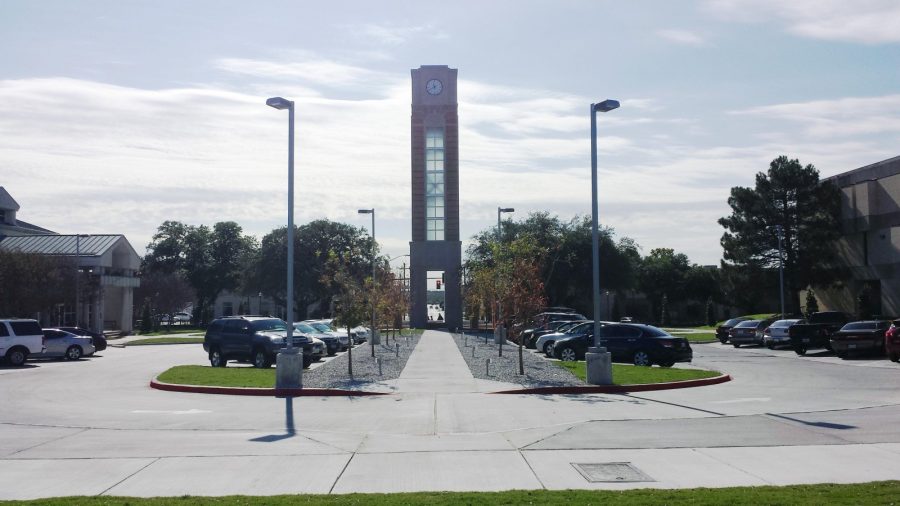The Texas Wesleyan University Board of Trustees affirmed President Fred Slabach’s decision to opt out of Senate Bill 11, more commonly referred to as campus carry, and remain a gun-free campus on Friday during a regularly scheduled spring meeting.
According to txwes.edu, Slabach’s decision was based on a consultation process that included email feedback requests and open forums with students, faculty and staff, and discussions with the Student Government Association, Alumni Association Board and the Board of Trustees Academic Affairs and Student Life Committee.
“We took the decision very, very seriously,” Slabach said in an interview shortly after the decision was announced. “We wanted to take our time to make sure we had everyone’s thoughts before we made our decision.”
Senate Bill 11, which goes into effect Aug. 1, 2016, will permit individuals who have a concealed handgun license (CHL) to carry their loaded, concealed weapon in college and university buildings. Public colleges and universities may determine limited “gun-free zones,” whereas private colleges and universities, like Wesleyan, may opt out of the law altogether.
More than 20 private Texas schools have chosen to opt out, including neighboring Texas Christian University in Fort Worth, Southern Methodist University in Dallas, and Rice University in Houston, according to texastribune.org.
But Slabach said that these universities’ decisions did not influence his.
“We were looking at this specifically with respect to our campus and the perception and concerns of the faculty, staff, and students here,” Slabach said.
Student Government Association Vice President Zahraa Saheb feels the administration has done a great job of listening to the students on this issue and both “respects and completely agrees” with Slabach’s decision.
“At the end of the day, this affects us,” Saheb said. “I’m here to learn, and I don’t want to worry about the person sitting next to me in class having a gun. You never know what’s going on in someone’s head and accidents happen.”
Dr. Twyla Miranda, Wesleyan’s faculty chair, also believes that Slabach made the right decision and appreciates the considerate and thoughtful discussion that faculty, students and staff have had over the campus carry law.
“As a result of the campus discussions, I am now more aware of campus safety,” Miranda said. “In fact, Wesleyan has added more measures of safety – better lighting, better security force, more call stations and off-duty armed police persons on campus.”
Slabach was also pleased with the campus discussions and how thoughtful everyone was on both sides, and said that safety was everyone’s primary concern.
In the campus-wide email announcing Wesleyan’s decision to remain gun free, Slabach addressed this, writing that the safety and well-being of students, faculty, staff and visitors continues to be a top priority.
“Over the last two years, we have done a significant amount of security enhancements,” Slabach said. “Even before the decision about campus carry was made, we had already made the decision and committed the funds to install blue light emergency stations by the end of February and to hire off duty Fort Worth police officers who are armed while they patrol on our campus.”
Additional security measures, such as 38 security cameras monitored by a full-time dispatcher, are listed in the email, and the university’s campus carry announcement can be found at https://txwes.edu/news-and-events/all-news/texas-wesleyan-to-remain-gun-free.





![Rambler staff pose following the Texas Intercollegiate Press Association Convention award breakfast. [Photo courtesy Dr. Jenny Dean]](https://therambler.org/wp-content/uploads/2025/04/IMG_2646-1200x900.jpeg)


![Pippin, played by Hunter Heart, leads a musical number in the second act of the musical. [Photo courtesy Kris Ikejiri]](https://therambler.org/wp-content/uploads/2025/04/Pippin-Review-1200x800.jpg)
![Harriet and Warren, played by Trinity Chenault and Trent Cole, embrace in a hug [Photo courtesy Lauren Hunt]](https://therambler.org/wp-content/uploads/2025/02/lettersfromthelibrary_01-1200x800.jpg)




![The Texas Wesleyan University women's golf team walks the course. [Photo courtesy of Corrina Griffin]](https://therambler.org/wp-content/uploads/2025/04/rounds-902x1200.jpg)
![Hunter Heart (center), the play's lead, rehearses a scene alongside other student actors. [Photo courtesy Jacob Sanchez]](https://therambler.org/wp-content/uploads/2025/04/thumbnail_IMG_8412-1200x816.jpg)
![Student actors rehearse for Pippin, Theatre Wesleyan's upcoming musical. [Photo courtesy Jacob Rivera-Sanchez]](https://therambler.org/wp-content/uploads/2025/04/Pippin-Preview-1200x739.jpg)
![Lady Rams softball wraps up weekend against Nelson Lions with a victory [6 – 1]](https://therambler.org/wp-content/uploads/2025/04/Screenshot-2025-04-04-100924-1200x647.png)


![Lady Rams softball sweep Langston Lions in first SAC Doubleheader [2 – 0]](https://therambler.org/wp-content/uploads/2025/02/SoftballLions.png)














Marcus Hamilton • Jan 24, 2016 at 7:19 pm
Great news!! Thus far, EVERY Texas private university has decided to opt out of campus carry (n=21), further proving the unpopularity of the law. The law has to be modified to allow public universities and community colleges to opt out as well, as MAJORITY of stakeholders (students, faculty, staff, campus security) were OPPOSED to passage of the law, along with MAJORITY of Texas residents, who either opposed campus carry or wanted the universities to decide for themselves.
Each university should have the autonomy to decide the best strategy for improving campus security, as there are safer and more effective options than allowing untrained, armed 21yr olds in classrooms and dorms.